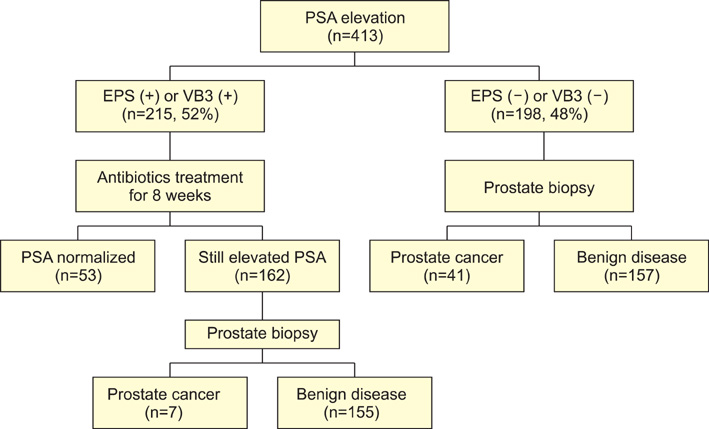Korean J Urol.
2012 Jan;53(1):50-53. 10.4111/kju.2012.53.1.50.
A Prospective Study of Reducing Unnecessary Prostate Biopsy in Patients with High Serum Prostate-Specific Antigen with Consideration of Prostatic Inflammation
- Affiliations
-
- 1Department of Urology, Inje University College of Medicine, Gimhae, Korea. ircho@paik.ac.kr
- KMID: 1988824
- DOI: http://doi.org/10.4111/kju.2012.53.1.50
Abstract
- PURPOSE
We aimed to reduce unnecessary prostatic biopsy in patients with high prostate-specific antigen (PSA) by consideration of prostatic inflammation.
MATERIALS AND METHODS
The investigation was conducted prospectively in 413 patients with a PSA level of 4 to 10 ng/ml from January 2004 to December 2009. All patients underwent the expressed prostatic secretion (EPS) or voided bladder urine 3 (VB3) test to be classified into two groups: positive group and negative group. Patients with a positive result on the EPS or VB3 test were treated with antibiotics for 2 months, and in cases in which the PSA level remained high, we performed prostate biopsy. In patients with a negative result on the VB3 test, we performed prostate biopsy directly.
RESULTS
Of the 413 study patients, 215 (52%) patients had positive findings on the EPS or VB3 test. After 8 weeks of antibiotics therapy, 53 of the 215 men avoided prostate biopsy because their PSA level was normalized. The other patients (162 of 215) still had elevated PSA levels of more than 4 ng/ml, including 7 patients in whom the biopsy revealed cancer. Patients with negative findings (198 of 413) underwent prostate biopsy. Of the 198 patients, 41 were diagnosed with prostate cancer. The total prostate cancer detection rate was 11.6% in our subjects, where as it was 20.7% in the patients with negative findings on the EPS or VB3 and 3.3% in the patients with positive findings, respectively.
CONCLUSIONS
In cases in which the PSA level is increasing, if we first exclude prostatitis and carry out a serial diagnostic procedure, it may help to reduce unnecessary prostatic biopsy.
MeSH Terms
Figure
Reference
-
1. Roberts RO, Bergstralh EJ, Lieber MM, Jacobsen SJ. Digital rectal examination and prostate-specific antigen abnormalities at the time of prostate biopsy and biopsy outcomes, 1980 to 1997. Urology. 2000. 56:817–822.2. Stamey TA, Yang N, Hay AR, McNeal JE, Freiha FS, Redwine E. Prostate-specific antigen as a serum marker for adenocarcinoma of the prostate. N Engl J Med. 1987. 317:909–916.3. Dalton DL. Elevated serum prostate-specific antigen due to acute bacterial prostatitis. Urology. 1989. 33:465.4. Bahnson RR. Elevation of prostate specific antigen from bacillus Calmette-Guerin-induced granulomatous prostatitis. J Urol. 1991. 146:1368–1369.5. Neal DE Jr, Clejan S, Sarma D, Moon TD. Prostate specific antigen and prostatitis. I. Effect of prostatitis on serum PSA in the human and nonhuman primate. Prostate. 1992. 20:105–111.6. Nadler RB, Humphrey PA, Smith DS, Catalona WJ, Ratliff TL. Effect of inflammation and benign prostatic hyperplasia on elevated serum prostate specific antigen levels. J Urol. 1995. 154:407–413.7. Potts JM. Prospective identification of National Institutes of Health category IV prostatitis in men with elevated prostate specific antigen. J Urol. 2000. 164:1550–1553.8. Kwak C, Ku JH, Kim T, Park DW, Choi KY, Lee E, et al. Effect of subclinical prostatic inflammation on serum PSA levels in men with clinically undetectable prostate cancer. Urology. 2003. 62:854–859.9. Stancik I, Lüftenegger W, Klimpfinger M, Müller MM, Hoeltl W. Effect of NIH-IV prostatitis on free and free-to-total PSA. Eur Urol. 2004. 46:760–764.10. Bozeman CB, Carver BS, Eastham JA, Venable DD. Treatment of chronic prostatitis lowers serum prostate specific antigen. J Urol. 2002. 167:1723–1726.11. Schaeffer AJ, Wu SC, Tennenberg AM, Kahn JB. Treatment of chronic bacterial prostatitis with levofloxacin and ciprofloxacin lowers serum prostate specific antigen. J Urol. 2005. 174:161–164.12. Cho IR, Kim GJ, Park SS, Choi HS. PSA and prostatitis in men under 45 years old. Korean J Urol. 1998. 39:633–637.13. Irani J, Levillain P, Goujon JM, Bon D, Doré B, Aubert J. Inflammation in benign prostatic hyperplasia: correlation with prostate specific antigen value. J Urol. 1997. 157:1301–1303.14. Morote J, Lopez M, Encabo G, de Torres IM. Effect of inflammation and benign prostatic enlargement on total and percent free serum prostatic specific antigen. Eur Urol. 2000. 37:537–540.15. Moser PL, Brunner A, Horninger W, Bartsch G, Mikuz G. Correlation between inflammatory cells (T and B lymphocytes, macrophages) in prostate biopsies and elevated PSA levels in a PSA screening population. Urology. 2002. 59:68–72.16. Carver BS, Bozeman CB, Williams BJ, Venable DD. The prevalence of men with national institutes of health category IV prostatitis and association with serum prostate specific antigen. J Urol. 2003. 169:589–591.17. Pansadoro V, Emiliozzi P, Defidio L, Scarpone P, Sabatini G, Brisciani A. Prostate-specific antigen and prostatitis in men under fifty. Eur Urol. 1996. 30:24–27.18. Hasui Y, Marutsuka K, Asada Y, Ide H, Nishi S, Osada Y. Relationship between serum prostate specific antigen and histological prostatitis in patients with benign prostatic hyperplasia. Prostate. 1994. 25:91–96.19. Chang SG, Kim CS, Jeon SH, Kim YW, Choi BY. Is chronic inflammatory change in the prostate the major cause of rising serum prostate-specific antigen in patients with clinical suspicion of prostate cancer? Int J Urol. 2006. 13:122–126.20. Nadler RB, Collins MM, Propert KJ, Mikolajczyk SD, Knauss JS, Landis JR, et al. Prostate-specific antigen test in diagnostic evaluation of chronic prostatitis/chronic pelvic pain syndrome. Urology. 2006. 67:337–342.21. Hochreiter WW. The issue of prostate cancer evaluation in men with elevated prostate-specific antigen and chronic prostatitis. Andrologia. 2008. 40:130–133.
- Full Text Links
- Actions
-
Cited
- CITED
-
- Close
- Share
- Similar articles
-
- High-Grade Prostatic Intraepithelial Neoplasia
- The Diagnostic Value of Prostate-specific Antigen and the of Routine Laboratory Examination for Early Detection
- Effects of Medication with Dutasteride on Detection of Prostate Cancer in Patients with Serum Prostate-specific Antigen Level of 4~10 ng/ml
- Inflammation of Prostate and Prostate-Specific Antigen
- Effects of Benign Prostatic Diseases on the Level of Serum Prostate Specific Antigen


